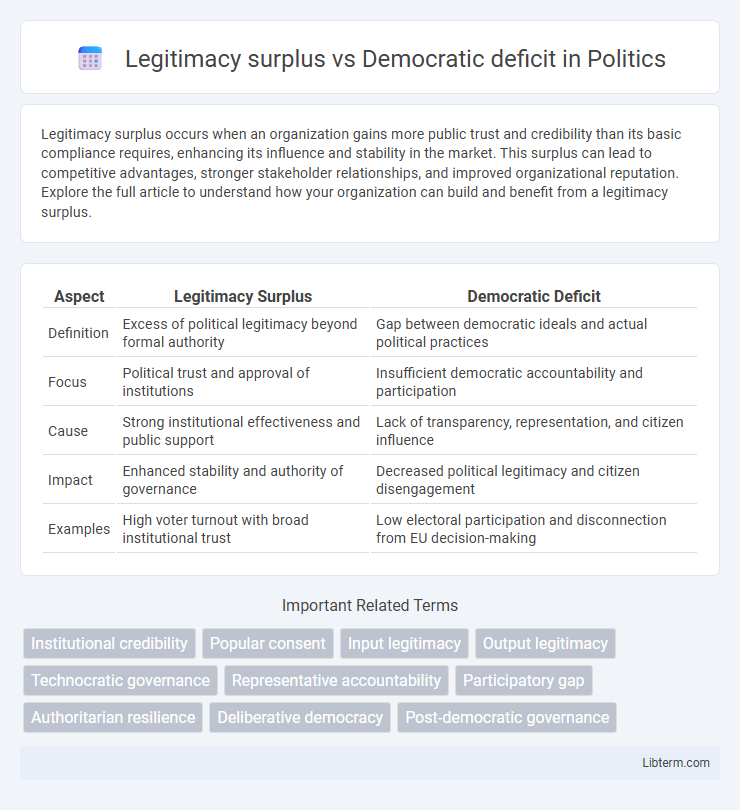Legitimacy surplus occurs when an organization gains more public trust and credibility than its basic compliance requires, enhancing its influence and stability in the market. This surplus can lead to competitive advantages, stronger stakeholder relationships, and improved organizational reputation. Explore the full article to understand how your organization can build and benefit from a legitimacy surplus.
Table of Comparison
| Aspect | Legitimacy Surplus | Democratic Deficit |
|---|---|---|
| Definition | Excess of political legitimacy beyond formal authority | Gap between democratic ideals and actual political practices |
| Focus | Political trust and approval of institutions | Insufficient democratic accountability and participation |
| Cause | Strong institutional effectiveness and public support | Lack of transparency, representation, and citizen influence |
| Impact | Enhanced stability and authority of governance | Decreased political legitimacy and citizen disengagement |
| Examples | High voter turnout with broad institutional trust | Low electoral participation and disconnection from EU decision-making |
Understanding Legitimacy Surplus and Democratic Deficit
Legitimacy surplus occurs when governing institutions are perceived as more legitimate than their democratic mandate warrants, often due to effective policy outcomes or institutional trust beyond electoral support. Democratic deficit arises when there is a gap between democratic ideals, such as representation and participation, and the actual functioning of political systems, leading to public disillusionment and decreased trust in political processes. Understanding legitimacy surplus and democratic deficit highlights the complex relationship between public trust, institutional performance, and democratic accountability.
Theoretical Foundations: Legitimacy in Democratic Systems
Legitimacy surplus occurs when a democratic system enjoys widespread public trust and support beyond its minimal requirements for governance, reflecting a strong normative foundation and effective institutional performance. In contrast, democratic deficit refers to the shortfall in legitimacy caused by perceived gaps between democratic principles and actual political practices, such as inadequate representation or lack of transparency. Theoretical foundations emphasize that legitimacy in democratic systems derives from popular sovereignty, procedural fairness, and institutional responsiveness, creating a balance essential for democratic stability and citizen engagement.
Causes and Consequences of Democratic Deficit
Democratic deficit arises from the lack of transparency, insufficient representation, and limited citizen participation in decision-making processes within political institutions. Causes include centralized power structures, bureaucratic complexities, and weak accountability mechanisms that disconnect elected officials from the electorate. Consequences involve growing public distrust, political apathy, decreased voter turnout, and challenges to the legitimacy of democratic institutions, risking social unrest and weakened governance.
Identifying Indicators of Legitimacy Surplus
Legitimacy surplus occurs when an institution or government enjoys higher levels of public trust and acceptance than expected, indicated by consistent electoral support, high voter turnout, and widespread citizen satisfaction with political processes. Key indicators include positive evaluations of government transparency, effective policy implementation, and robust civic engagement. These factors contrast with a democratic deficit, characterized by public dissatisfaction, low participation, and perceived lack of accountability.
Case Studies: Legitimacy Surplus in Modern Governance
Legitimacy surplus occurs when political institutions or governments garner higher public trust and acceptance than required by democratic standards, often seen in Scandinavian countries like Sweden and Denmark, where extensive welfare systems and transparent governance bolster citizen confidence. In contrast, democratic deficit, as observed in the European Union, arises when decision-making processes lack sufficient transparency or accountability, leading to public disengagement despite formal democratic structures. Case studies of legitimacy surplus highlight the positive impact of social inclusiveness and effective public services in sustaining high legitimacy in modern governance frameworks.
Impacts of Democratic Deficit on Public Trust
The democratic deficit often leads to diminished public trust in political institutions and governance processes, as citizens perceive a lack of accountability and representation. This erosion of trust can result in decreased voter turnout, political apathy, and skepticism toward policy decisions. Consequently, addressing the democratic deficit is crucial for restoring legitimacy surplus and enhancing the responsiveness of democratic systems.
Balancing Legitimacy and Democracy: Key Challenges
Balancing legitimacy and democracy involves addressing the legitimacy surplus, where institutions enjoy high public trust despite limited democratic input, and the democratic deficit, characterized by insufficient citizen participation in decision-making processes. Key challenges include enhancing transparency and accountability to ensure that democratic mechanisms effectively reflect public will while maintaining institutional stability. Strategies such as participatory governance and institutional reforms aim to reconcile these tensions by promoting both effective governance and citizen engagement.
Institutional Reforms for Reducing Democratic Deficit
Institutional reforms aimed at reducing the democratic deficit focus on enhancing transparency, accountability, and citizen participation within political institutions to restore legitimacy surplus. Measures such as strengthening parliamentary oversight, implementing proportional representation, and expanding mechanisms for public consultation increase responsiveness and inclusiveness. These reforms address gaps in democratic representation and decision-making authority, thereby improving legitimacy and trust in governance structures.
Future Trends: Legitimacy Surplus in Digital Democracies
Digital democracies increasingly exhibit a legitimacy surplus as citizens gain enhanced access to information and participatory tools, fostering greater trust and engagement in political processes. Advances in blockchain voting, AI-driven policy analysis, and real-time public consultations enable more transparent, accountable, and inclusive governance structures. These innovations reduce the traditional democratic deficit by bridging gaps between governments and constituents, promoting a future where legitimacy derives from active, technologically-supported citizen involvement.
Policy Solutions: Bridging the Legitimacy-Democracy Gap
Addressing the legitimacy surplus alongside the democratic deficit requires policy solutions that enhance transparency, accountability, and citizen participation in governance. Implementing robust mechanisms such as participatory budgeting, citizen assemblies, and digital consultation platforms strengthens democratic engagement and restores public trust. Institutional reforms promoting checks and balances ensure policies reflect diverse interests, effectively bridging the gap between legitimacy and democracy.
Legitimacy surplus Infographic

 libterm.com
libterm.com